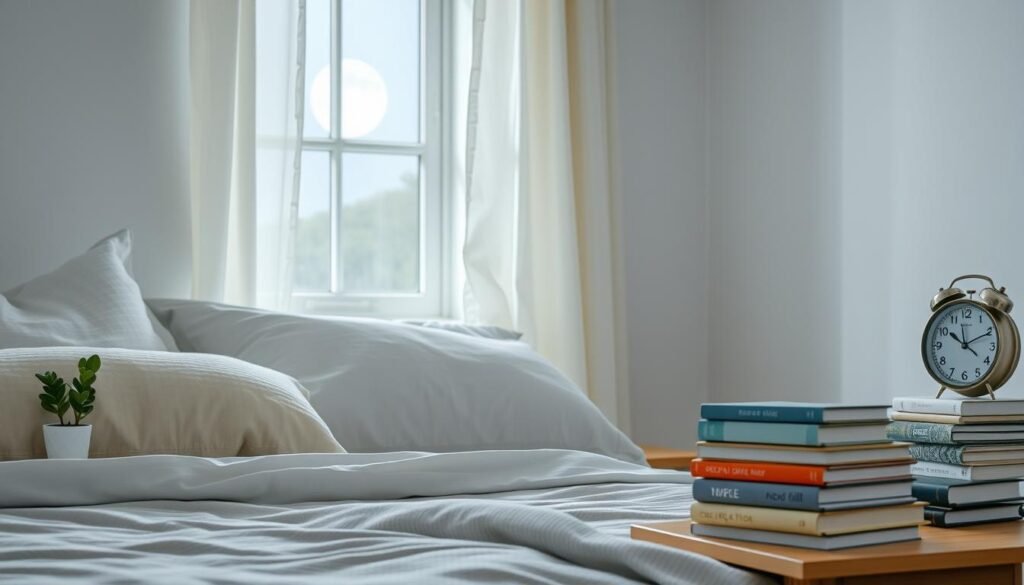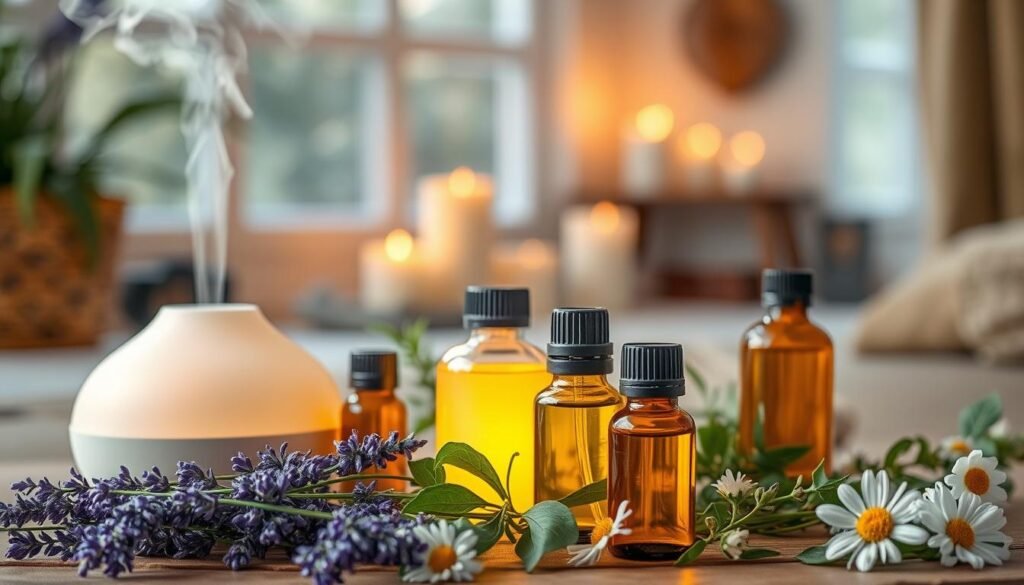More than 60 million Americans suffer from poor sleep quality. This can lead to serious emotional and physical health issues. Poor sleep can make you feel tired, cause memory problems, and lower your ability to focus. It can upset your mood and increase your risk for diseases like depression and heart disease.
Dr. Charlene Gamaldo says natural remedies can really help. They offer a safe alternative to drugs for better sleep. Trying simple things like warm milk, chamomile tea, and tart cherry juice at night can make a big difference. These can create a calm sleep space, aiding in treating anxiety and insomnia effectively.
Key Takeaways
- Over 60 million Americans struggle with sleep-related issues, impacting their health.
- Natural remedies, such as chamomile tea and tart cherry juice, can aid in anxiety and insomnia treatment.
- Exercise promotes better sleep by increasing deep sleep cycles.
- Maintaining an ideal sleep temperature can enhance sleep quality.
- Medications and supplements should be used cautiously and guided by healthcare professionals.
The Connection Between Anxiety and Insomnia
Anxiety and insomnia can form a harmful cycle. Anxiety disorders greatly affect sleep. About 326 people in a study showed insomnia symptoms while getting therapy for anxiety. Those with PTSD, GAD, and panic disorder had more sleep issues. They found it hard to stay asleep and get good rest.
People with GAD often have insomnia too. This shows a big need for treating both conditions. A study found that 58% of those with major depression also have anxiety. Treating both can help improve mental health. Insomnia and panic disorder are strongly linked, studies confirm.
Although these conditions are closely connected, insomnia is not always treated. It’s vital to recognize symptoms early. Treatments include medications and therapy. The FDA approved several sleep medications. Nonbenzodiazepines are preferred for their safety. Medications work quickly, but therapy targets the root cause and lasts longer.
Understanding their connection helps in managing both better. To learn more about handling anxiety and insomnia, check out this guide.
Understanding Anxiety Disorders
Anxiety disorders include a range of mental health challenges. Conditions such as generalized anxiety disorder (GAD), panic disorder, and social anxiety are common. They can greatly disrupt someone’s day-to-day life and interactions.
While regular anxiety might spur action, these disorders cause lasting fear and stress. This can go on for months or even years.
Generalized anxiety disorder involves constant worry. This affects various parts of life and can be quite debilitating. Panic disorder leads to sudden, intense panic attacks. These can occur many times a day or just sometimes. Social anxiety disorder makes people very afraid of being judged, harming social and work life.
Other types include phobias and agoraphobia, the fear of open or crowded places. Separation anxiety affects both kids and adults with a fear of being away from family. Selective mutism affects speaking in certain social situations.
Cognitive behavioral therapy (CBT) is a top treatment for these disorders. It helps change negative thoughts and behaviors into positive ones. Acceptance and Commitment Therapy (ACT) also helps, by teaching mindfulness and setting goals, but it’s not as proven as CBT.
Medicines can help with anxiety and sleep issues too. Antidepressants work on brain chemicals to improve mood. Anti-anxiety medicines offer quick relief but can be addictive over time. Many people with anxiety also have trouble sleeping, showing how these problems are connected.
| Disorder Type | Characteristics | Treatment Methods |
|---|---|---|
| Generalized Anxiety Disorder (GAD) | Persistent anxiety affecting daily life. | Cognitive Behavioral Therapy, Antidepressants |
| Panic Disorder | Frequent and unexpected panic attacks. | CBT, Anti-Anxiety Medications |
| Social Anxiety Disorder | Intense fear of judgment by others. | CBT, Beta-Blockers |
| Phobia-Related Disorders | Extreme fear of specific situations or objects. | CBT, Exposure Therapy |
| Agoraphobia | Fear of open or crowded spaces. | CBT, Medication |
Knowing about these disorders and how to treat them is key. With the right help, individuals can manage their anxiety. This opens the door to a happier life.
Natural Relief for Anxiety and Insomnia Treatment
Finding natural remedies for anxiety and insomnia is key to better mental health. Many people opt for non-drug solutions. These address their symptoms and improve overall well-being.
Working out is great for tackling both anxiety and sleep issues. Just 20 minutes of activity each day can help. It greatly reduces insomnia and the anxiety linked to it.
Herbs are now popular for treating anxiety and sleeplessness. For instance, chamomile helps decrease anxiety. Lavender works well, too, especially in aromatherapy form. However, with passionflower, the outcomes might differ. It’s important to be careful with herbal treatments. They could interact with other meds or make you sleepy during the day.
Meditation and mindfulness could really help you relax. Studies have shown they can improve sleep and fight insomnia. Progressive muscle relaxation is another effective strategy. It helps in achieving sound sleep without medicine.
There are many natural methods out there for dealing with anxiety and insomnia. Each one has its own benefits. They can be customized to fit what you need in a full plan.
Importance of Sleep Hygiene
Good sleep hygiene is key to high-quality rest. A lot of people find it hard to sleep well due to different reasons. It’s common for about one-third of people to have trouble sleeping at times. More folks are turning to non-drug ways to sleep better, making good habits essential.
Establishing a Regular Sleep Schedule
Having a set sleep schedule is crucial. Going to bed and waking up at the same times every day helps your sleep-wake cycle. It makes your sleep steadier. By sticking to specific sleeping hours, your body gets used to it. This method aids in quicker sleep onset and a more refreshing sleep.
Creating a Relaxing Bedtime Routine
Building a calming bedtime routine is also important. Doing activities that relax you before bed improves sleep quality. Whether it’s gentle stretching, reading, or a quiet hobby, these acts get you ready for sleep. Making these small adjustments can really boost how well you fall and stay asleep.

Effective Relaxation Techniques
Today’s world is full of stress. Effective relaxation techniques are key for managing anxiety and sleep problems. A national survey found that 44 percent of adults have trouble sleeping due to stress. Using methods like mindfulness and muscle relaxation can greatly help our mental health.
Meditation and Mindfulness Practices
Mindfulness meditation helps focus on the now. It calms the mind and lessens anxiety. Just 20 to 25 minutes of it daily can improve stress-induced sleep problems.
Regular mindfulness practice decreases stress hormones. This makes sleeping easier and improves sleep quality.
Progressive Muscle Relaxation
Progressive muscle relaxation means tightening then relaxing muscles. It eases tension and promotes well-being. This technique helps with quick and deep relaxation, cutting down on restless nights.
To really understand meditation and muscle relaxation, dive into various techniques. Visualization and deep breathing also help. For more exercises, visit this resource.
| Relaxation Technique | Benefits |
|---|---|
| Mindfulness Meditation | Improves focus, lowers stress, enhances mood |
| Progressive Muscle Relaxation | Reduces muscle tension, helps control anxiety |
| Deep Breathing | Slows heart rate, lowers blood pressure |
| Visualization | Enhances mental clarity, promotes relaxation |
The Role of Exercise in Stress Management
Exercise is a great way to fight anxiety and boost mental health. Around 40 million adults in the U.S. suffer from anxiety disorders. So, there’s a huge need for good stress management methods. Regular exercise can make you feel less stressed, happier, and more confident.
Studies show active people feel less anxious and sad than those who are inactive. Even a quick 10-minute walk can help as much as a longer 45-minute workout. This shows how vital moving every day is.
The U.S. Department of Health and Human Services suggests adults should do moderate aerobic exercise for 150 minutes every week. You could try brisk walking, cycling, or dancing. Working out three to five times a week for 30 minutes helps you keep a routine and stay healthy.
- Being active can cut your risk of anxiety or depression by 25% over five years.
- Exercises like aerobics help you sleep better, which is key for a sharp mind and stable emotions.
- Endorphins released during exercise make you feel good and relaxed.
Exercise helps most people, but not everyone reacts the same way. It’s key to find the right exercise for you. Choose activities you like and set realistic goals to stick with it and see mental health benefits.

Doing strength exercises twice a week, along with aerobic ones, boosts mental health benefits even more. Trying interval training, which mixes short intense activities, saves time and still offers great results.
While exercise is key for managing stress, it’s just one part. Therapy and medication also play big roles. Together, they offer a well-rounded way to handle anxiety and depression.
Herbal Remedies for Anxiety and Insomnia
Many people turn to natural solutions to ease anxiety and insomnia. Herbal remedies are popular for their gentle effects. Chamomile and tart cherry juice are widely favored for their calming properties. By adding these to daily life, people can improve sleep and lessen anxiety.
Chamomile and Its Benefits
Chamomile is celebrated for its soothing effects. Studies show it improves sleep and reduces anxiety symptoms. Taking 200 milligrams of chamomile extract daily for a month can notably better sleep, especially in seniors. Also, 220 to 1100 milligrams over eight weeks can decrease generalized anxiety. This makes chamomile a handy choice for better sleep and mood stabilization.
Tart Cherry Juice and Sleep Cycle Regulation
Tart cherry juice is great for insomnia. It helps adjust melatonin levels, essential for a good sleep cycle. It’s a healthy diet addition for those with sleep troubles. Lemon balm and valerian root also help, offering more ways to tackle anxiety and sleep problems naturally.
| Herbal Remedy | Dosage | Primary Benefits |
|---|---|---|
| Chamomile | 200-1100 mg daily | Improves sleep quality and decreases anxiety |
| Tart Cherry Juice | Varies | Regulates melatonin, enhances sleep cycle |
| Lemon Balm | 300 mg twice daily | Helps with insomnia and anxiety |
| Valerian Root | 400-900 mg before bedtime | Assists with insomnia |
Aromatherapy for Calming Effects
Aromatherapy is a great way to relax and ease anxiety. It uses essential oils to create calming smells. Studies show oils like lavender, ylang ylang, and bergamot really help. They lower stress and help you sleep better.
Essential Oils for Stress Relief
Some essential oils are excellent for fighting anxiety. Lavender oil helps you fall asleep faster and sleep longer. A study in a care unit found patients felt calmer and slept better with lavender aromatherapy. Another review said aromatherapy improves sleep by reducing stress, anxiety, pain, and tiredness.
The chart below shows essential oils used for anxiety relief and their benefits:
| Essential Oil | Benefits |
|---|---|
| Lavender | Reduces stress, improves sleep quality, promotes relaxation |
| Ylang Ylang | Destresses, helpful in calming the nervous system |
| Bergamot | Reduces anxiety levels, enhances mood balance |
| Frankincense | Supports emotional balance, promotes relaxation |
| Chamomile | Calms the mind, aids in improving sleep |
| Clary Sage | Helps in lowering stress and anxiety levels |
It’s important to use essential oils safely to avoid problems. Always dilute oils with a carrier oil to prevent skin irritation. One drop of essential oil per teaspoon of carrier oil is a good rule. Using a diffuser is a safe way to enjoy the benefits.
Aromatherapy has many benefits, but it doesn’t replace medical treatment. If you have breathing problems, epilepsy, or allergies, get advice before starting aromatherapy. Essential oils can be a part of a larger plan to tackle anxiety. For more on how aromatherapy helps well-being, check out this detailed article.

Cognitive Behavioral Therapy (CBT) Approaches
Cognitive Behavioral Therapy (CBT) is a powerful way to deal with anxiety disorders. It changes negative thoughts and gives people ways to handle their issues. For those dealing with insomnia, CBT works better than regular meds. These often give short-term relief and can lead to dependency.
CBT for insomnia usually takes six to eight sessions. It teaches cognitive restructuring to tackle wrong beliefs about sleep. This helps people approach sleep more realistically. Part of CBT involves stimulus control, sleep limiting, and relaxation methods. Stimulus control means leaving the bed if not asleep in 15 to 20 minutes. This helps build a stronger link between bed and sleeping.
Using sleep restriction lowers the time spent in bed, thus improving sleep drive. These methods show a 70-80% improvement in people with primary insomnia. CBT not only lessens insomnia but also helps with anxiety symptoms.
| Technique | Description | Goal |
|---|---|---|
| Cognitive Restructuring | Changing negative thoughts about sleep | Develop realistic sleep expectations |
| Stimulus Control | Leaving bed if not asleep in 15-20 minutes | Strengthening the bed-sleep connection |
| Sleep Restriction | Reducing time spent in bed | Increase sleep drive and reduce insomnia |
| Relaxation Techniques | Methods like deep breathing, biofeedback | Reduce anxiety and promote sleep |
However, the U.S. has a limited number of behavioral sleep medicine therapists. This makes it hard for some to get this helpful therapy for anxiety disorders. While sleep hygiene alone is not very effective, it supports a full CBT plan. If interested, individuals should talk to trained professionals for more information. For more details on insomnia treatment and CBT’s effectiveness, visit the Mayo Clinic.
Conclusion
Dealing with anxiety and insomnia needs different ways to find relief and get better. Around 30% of adults have trouble sleeping. Nearly 10% have serious insomnia issues. It’s key to see how better sleep links to feeling well overall. Doing things like keeping a good sleep routine, trying herbal options, and using cognitive therapy can really help improve your life.
Having a steady sleep schedule and relaxing are very important. Research shows that insomnia can last for years and often comes with anxiety and depression. By using natural methods and getting professional help when needed, you can get better sleep and handle anxiety better. Making these methods a part of your life can lead to real and lasting improvements in sleep.
It’s crucial to take care of your mental and physical health to beat insomnia. For those wanting to know more about how to sleep better, there’s a lot of information out there. This includes methods for natural relief. With the right knowledge and support, you can work towards better health and enjoy the benefits of sleeping well.